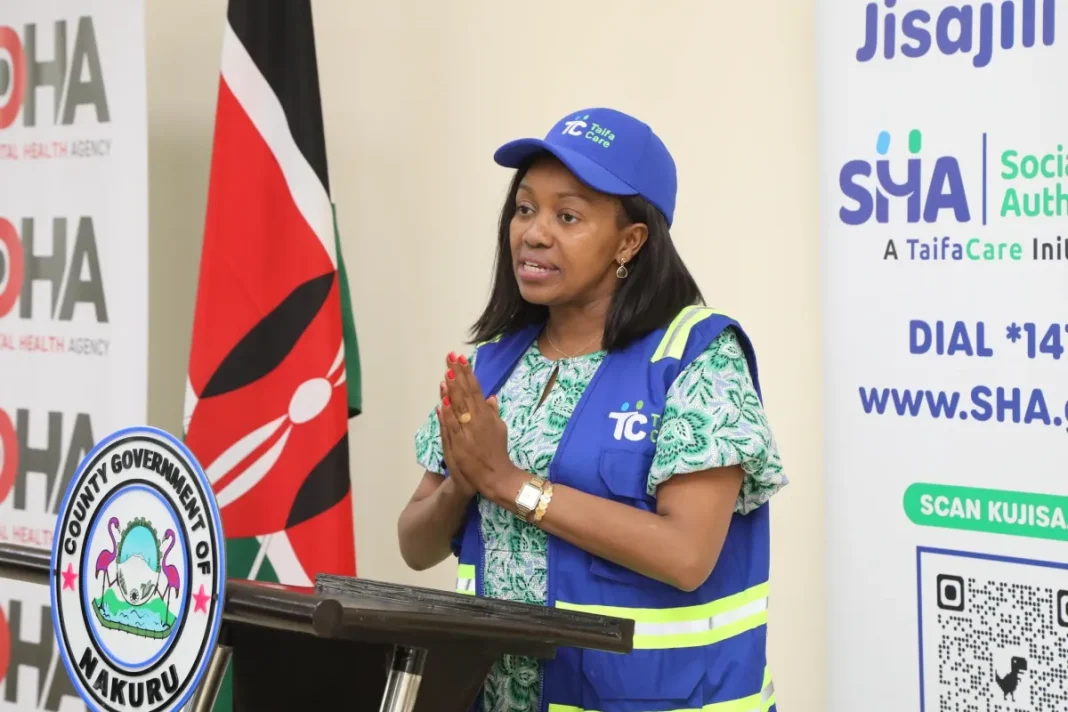Nakuru County has partnered with the World Health Organization (WHO) and the University of Nairobi (UoN) to train health workers in the prevention and management of Postpartum Haemorrhage (PPH) the leading cause of maternal deaths in Kenya.
The county’s Director for Health Planning and Administration, Dr Joy Mugambi, said the programme targets nurses, midwives, doctors, and clinical officers, equipping them with practical skills to detect and manage excessive bleeding after childbirth.
The initiative also involves clinical trials for a new drug, Heat-Stable Carbetocin (HSC), under the Research to Expand Access to Heat-Stable Carbetocin (REACH) project. The trials are being conducted at Nakuru County Referral and Teaching Hospital, Machakos Level 5 Hospital, and Pumwani Maternity Hospital.
Dr Mugambi explained that the trials aim to assess the safety and effectiveness of HSC as a first-line treatment for postpartum bleeding, noting that the findings will help shape national health policies and inform future treatment protocols.
She emphasized that early detection and quick intervention are vital in saving lives. “We cannot allow mothers to continue dying from preventable conditions like PPH. Continuous training and early diagnosis are the key to ending these deaths,” she said.
The initiative comes amid worrying statistics showing that Kenya records 355 maternal deaths per 100,000 live births, with PPH accounting for up to 45 percent of the cases.
Health workers are also being trained on the use of calibrated delivery drapes, a new blood-measurement tool that enables accurate monitoring of blood loss after childbirth. The innovation helps identify danger levels early allowing timely action before complications escalate.
Professor Zahida Qureshi, Head of the Department of Obstetrics and Gynaecology at UoN and Principal Investigator of the study, said the heat-stable Carbetocin drug offers a practical solution as it does not require refrigeration, making it ideal for rural health facilities.
“Many mothers die because postpartum bleeding is detected late or underestimated. HSC offers a more reliable and accessible solution, especially in low-resource areas,” said Prof Qureshi.
Dr Testa Dey from WHO noted that expanding the use of HSC beyond prevention to treatment could revolutionize maternal healthcare in Africa, significantly reducing maternal mortality rates.
The county affirmed that it will continue supporting evidence-based healthcare initiatives that prioritize women’s health and safety.







[4425]Paldo77 Login & Register: The Best Online Slot Platform in the Philippines. Access Paldo77 Link Alternatif and Download APK for an Elite Gaming Experience. Experience the best online slot platform in the Philippines with Paldo77. Get easy Paldo77 login & register access, use the link alternatif, and download apk for elite gaming today! visit: paldo77
Thanks for every other fantastic post. The place else could anyone get that type of info in such an ideal way of writing? I’ve a presentation next week, and I’m on the search for such information.
I’ve been absent for a while, but now I remember why I used to love this website. Thank you, I’ll try and check back more frequently. How frequently you update your website?
Keep working ,splendid job!
Dead composed articles, Really enjoyed reading through.
I conceive this website holds some very superb information for everyone : D.
Bạn có bao giờ thắc mắc về khả năng ứng dụng công nghệ blockchain để tăng cường tính minh bạch cho các thuật toán RNG? Đây chính là hướng phát triển nhà cái 188v đang nghiên cứu để nâng cao trải nghiệm người dùng trong tương lai.
slot365 link Chưa dừng lại ở đó, hệ thống bảo mật của chúng tôi cũng đã nhận về rất nhiều lời khen từ chuyên gia cá cược. Nhà cái hiện đang sử dụng công nghệ mã hoá SSL chuẩn 128 bit hiện đại. Vì vậy toàn bộ thông tin cá nhân người dùng sẽ tránh được hoàn toàn tình trạng hacker xâm nhập và đánh cắp. Tuy nhiên để tăng tính an toàn tối đa, thương hiệu vẫn thường xuyên khuyến cáo bet thủ nên thay đổi password định kỳ.
Không chỉ sở hữu chứng nhận hợp pháp bởi CURACAO Gaming, rtp slot365 còn được đánh giá cao khi toàn bộ trang web đều vận hành đảm bảo theo tiêu chuẩn mã hóa SSL 12 Bit. Chúng tôi nói không tuyệt đối với những hành vi xâm nhập từ bên thứ ba không rõ nguồn gốc.
It’s laborious to find knowledgeable folks on this topic, however you sound like you already know what you’re speaking about! Thanks
Đặc biệt, live slot365 còn thường xuyên cập nhật thêm phiên bản mới lạ để phục vụ hoàn hảo nhu cầu khách hàng. Các sản phẩm luôn đảm bảo quy trình kiểm tra kỹ lưỡng, nghiêm ngặt trước khi tới tay người chơi nên bạn hoàn toàn yên tâm.
Hiện nay, slot365 xx vip là nền tảng cá cược trực tuyến được nhiều nhà cung cấp game săn đón khi thu hút hơn 10 triệu lượt đăng ký kể từ khi ra mắt. Hơn 99+ NPH đã và đang cung cấp trò chơi trực tiếp tại trang chủ chính thức của chúng tôi với đa dạng lối chơi mới lạ.
You completed various fine points there. I did a search on the subject matter and found the majority of folks will have the same opinion with your blog.
Appreciate it for helping out, good information. “The laws of probability, so true in general, so fallacious in particular.” by Edward Gibbon.
Hi there would you mind letting me know which web host you’re working with? I’ve loaded your blog in 3 completely different browsers and I must say this blog loads a lot quicker then most. Can you recommend a good internet hosting provider at a reasonable price? Thank you, I appreciate it!